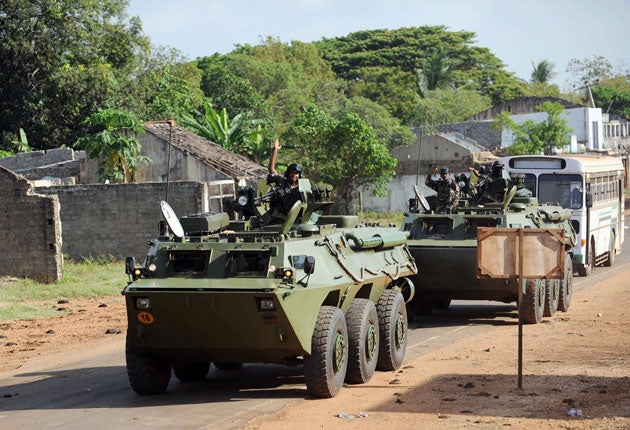Sri Lanka ends 'combat operations' on Tamil rebels
President claims victory and calls off air strikes to focus on 'rescuing' civilians

Your support helps us to tell the story
As your White House correspondent, I ask the tough questions and seek the answers that matter.
Your support enables me to be in the room, pressing for transparency and accountability. Without your contributions, we wouldn't have the resources to challenge those in power.
Your donation makes it possible for us to keep doing this important work, keeping you informed every step of the way to the November election

Andrew Feinberg
White House Correspondent
The Sri Lankan government ordered an end to the use of heavy weaponry against the beleaguered Tamil Tiger rebels yesterday, but stopped short of the full cessation of combat that foreign governments and aid groups have demanded.
President Mahinda Rajapaksa said in a statement that "combat operations have reached their conclusion". He added that the use of air strikes and artillery fire against the Liberation Tigers of Tamil Eelam (LTTE) would end immediately.
But the change does not constitute a ceasefire. "Security forces are now reaching victory," an army statement said. "[We will] in no form leave a breather for the internationally banned terrorist outfit or its leaders."
UN Humanitarian Affairs chief John Holmes cautiously welcomed the news. "I hope the idea of not using heavy weapons will be genuinely respected this time, which I'm afraid it has not been in the past," he said.
The announcement is intended to show a sceptical international community that the focus of the operation has shifted to "rescuing" civilians in the so-called "No-Fire Zone", the coastal strip where the last remnants of the rebel forces – at most 2,000 soldiers – are holed up among 50,000 civilians.
Independent access to refugee camps for those who have escaped has been strictly controlled, but reports suggest that Tamil civilians are kept in by barbed wire and provided with limited facilities. After a visit to the camps, the UK's minister for International Development, Mike Foster, yesterday said that they "met only basic needs".
Unconfirmed reports from the pro-LTTE TamilNet website suggested that there had been two artillery attacks on the No-Fire Zone after the government announcement. LTTE spokesman Seevaratnam Puleedevan called the move "an attempt to deceive the international community".
The announcement came a day after the Sri Lankan military dismissed the LTTE's ceasefire as a strategic ploy, and was met with a doubtful response. The government has previously deflected criticisms of its use of artillery by insisting that it had abandoned such methods weeks ago. "It's significant as an implicit admission that they've been lying to everybody," said Brad Jones, Asia Director at Human Rights Watch, one of the NGOs that has been barred from the conflict zone, along with reporters. "It would also be significant if they actually stopped shelling, but in light of the fact that they've lied so far I don't think we can take it at face value."
As the 25-year war edges closer to an end, international attention has switched to the state of the refugee camps that house Tamils fleeing the violence. Mr Foster said that the Sri Lankan government had committed to resettling 80 per cent of refugees within a year. And he insisted that they should "be seen as transit camps ahead of people having full resettlement". But, he added, "The present facilities for those escaping the conflict are unable to cope."
Britain is donating 5,000 tents for refugees, and Foreign Secretary David Miliband will fly to Colombo as part of a European delegation tomorrow, but the impact of diplomatic efforts may be limited. "It's too late to avoid a very large-scale humanitarian crisis," said Mr Jones of Human Rights Watch. "It would have been great to see them going out weeks ago."
Before yesterday's announcement, the human cost of the conflict did not appear to be easing despite government and LTTE promises to protect civilians. "I have had no indication that fewer casualties are coming," said surgeon Paul McMaster who works for Médecins Sans Frontières.
Hospitals are heavily overcrowded, with one facility at Mannar attempting to treat 1,000 patients with just 350 beds, some of them in tents outside.
In London, hundreds of Tamil demonstrators chanting "ceasefire now!" marched outside the Sri Lankan High Commission. At least three people were arrested after protesters broke windows in a smaller protest at the Indian High Commission.
Subscribe to Independent Premium to bookmark this article
Want to bookmark your favourite articles and stories to read or reference later? Start your Independent Premium subscription today.
Join our commenting forum
Join thought-provoking conversations, follow other Independent readers and see their replies
Comments